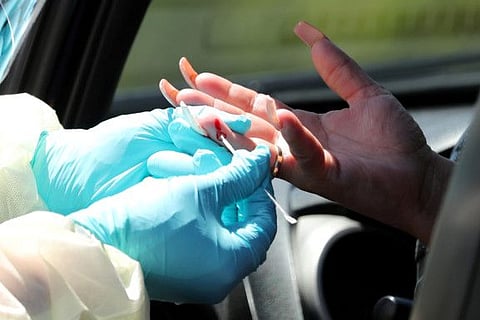COVID-19 repatriation: Safety of India’s pre-departure test, no social distancing onboard explained
What are IgM/IgG tests for returnees, why no social distancing on board?

Dubai: Several people have raised concerns that India is not conducting COVID-19 tests and not following social distancing onboard for its biggest ever repatriation exercise called Vande Bharat Mission which begins with two flights from the UAE on Thursday.
However, Gulf News has learnt that the pre-departure medical screening may help in identifying if a passenger has had a recent coronavirus infection or developed immunity after a recent infection.
This is possible through the IgM/IgG tests that have been specified by the Indian Embassy in the health protocol announced for the returning Indians.
Dr. Muhammed Shafeeq. K, specialist pulmonologist with Aster Hospital, Mankhool, explained that these are blood tests to detect antibodies against COVID-19 in patients’ serum.
It will take only five to 10 minutes for the results to come, he said.
“Patients who are only IgM positive indicates that they have had recent infection.”
However, people have to undergo PCR test to effectively verify if they are currently positive for COVID-19, he clarified.
“This is because IgM becomes positive only after five to seven days of infection and will remain positive for even up to one to two months.”
“So patients who are having acute infection might be missed if we are relying only on IgM because it takes five to seven days after infection for IgM to be detectable in serum,” he explained.
Similarly, Dr. Shafeeq said IgG, which indicates that patient has developed immunity to the virus, appears 10- 14days after infection.
Passengers testing positive for both IgM and IgG positive may not be allowed to travel.
Apart from the IgM and IgG tests, passengers will also be screened for temperature and other common symptoms of COVID-19.
Hence, it is expected that passengers who are both IgM and IgG negative would be allowed to board the flight if they do not have typical symptoms of COVID-19.
People who will test positive for IgG may be allowed to travel if they do not have typical symptoms of Covid-19. However, passengers who are only IgM positive may not be allowed to travel even though they do not have any typical symptoms.
The final decisions on these will be taken by the local health authorities conducting the tests.
No social distancing onboard is ok: IATA
India has not stipulated social distancing on board the repatriation flights. Gulf News had first reported that only some seats would be reserved for isolating patients developing symptoms or discomfort onboard.
Meanwhile, the International Air Transport Association (IATA) has announced that it does not support mandating social distancing measures that would leave ‘middle seats’ empty.
IATA on Wednesday said it supports the wearing of face coverings for passengers and masks for crew while on board aircraft as a critical part of a layered approach to biosecurity to be implemented temporarily when people return to traveling by air.
Evidence suggests that the risk of transmission on board aircraft is low. Mask-wearing by passengers and crew will reduce the already low risk, while avoiding the dramatic cost increases to air travel that onboard social distancing measures would bring, IATA said
Moreover, even if mandated, keeping the ‘middle seat’ open will not achieve the recommended separation for social distancing to be effective. Most authorities recommend 1m-2m while the average seat width is less than 50 cm, it added.
According to the health protocol announced by the Indian Embassy, each passenger, at the time of boarding would be handed over a safety kit containing two three-layered face masks, two pairs of gloves and pouches/small bottles of hand sanitisers.
While on board the flight, the health protocol of the Ministry of Civil Aviation of India will be strictly followed.
“This would include wearing of masks, environmental hygiene, respiratory hygiene and hand hygiene. This will be followed by the airline staff, crew and all passengers,” the embassy said.
Sign up for the Daily Briefing
Get the latest news and updates straight to your inbox



